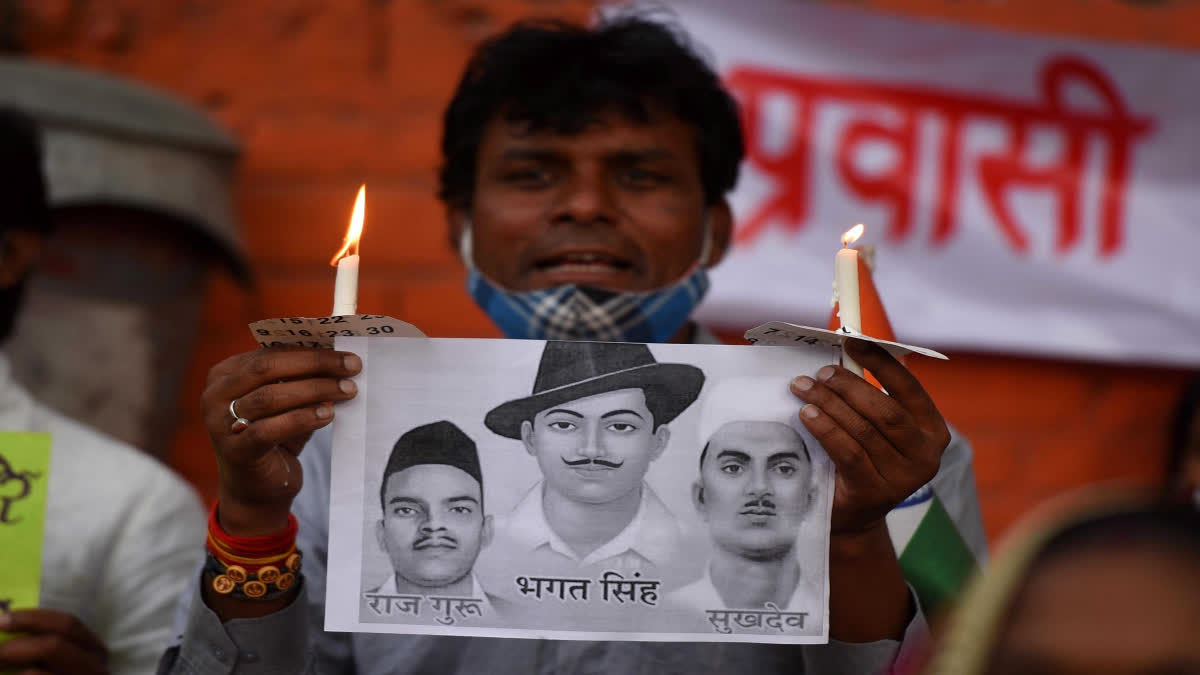Hyderabad:Shaheed Diwas is observed every year on 23 March in India. On March 23 in 1931, Bhagat Singh, Shivaram Rajguru and Sukhdev Thapar were hanged during the British Rule.
It has been over nine decades since the death of these three freedom fighters. Remembering their sacrifice, March 23 was declared as 'Shaheed Diwas' or Martyrs' Day.
History of Shaheed Diwas: Bhagat Singh, along with his companions, Shivaram Rajguru and Sukhdev Thapar, became an inspiration for the youth of the country for their daring adventures. On April 8, 1929, they threw bombs at the Central Legislative Assembly while shouting the slogan – 'Inquilab Zindabad'. They were soon arrested and charged with murder. On March 23, 1931, Bhagat Singh, Shivaram Rajguru, and Sukhdev Thapar were hanged.
Significance of Martyr's Day: The Martyr's Day reminds us of the sacrifices made by the brave freedom fighters who gave up their life for India's freedom. This day helps us to honor the struggles and sacrifices made by the brave men and women of India to get independence from British rule. This day serves as an inspiration for the current generation and tribute to the sacrifices made by the people. It should remind us to continue to work toward the progress and development of the country.
The Martyr's Day helps us understand the value of freedom and the sacrifices made by our ancestors to attain it. We should never take our freedom for granted and must always make efforts to protect it. It instills a sense of patriotism in us to help us work towards the betterment of our country. The day is a symbol of unity and pride for the nation as well.
About Bhagat Singh: Bhagat Singh was born on September 27, 1907, in the village of Banga near Lyallpur district in Punjab, British India. He was an Indian freedom fighter who is considered to be one of the most influential revolutionaries of the Indian independence movement. Bhagat Singh joined the Hindustan Republican Association (HRA) at a young age and became involved in revolutionary activities.
He participated in several acts of sabotage against British institutions, including an attempt to bomb the Central Legislative Assembly in Delhi. In 1929, he and two other activists were convicted of assassinating John Saunders, a British police officer. Singh was executed by hanging on March 23, 1931, at Lahore jail at the age of 23. Despite his short life, Bhagat Singh left a lasting legacy in the struggle for Indian independence. He is revered by many as a martyr and symbol of resistance to British colonialism in India. His example continues to inspire new generations of activists worldwide.
Rajguru:Shivaram Rajguru was a great Indian freedom fighter. He played a vital role in India’s Independence. Not many know that his full name was Hari Shivaram Rajguru. He belonged to a Marathi Brahmin Family from Pune. Rajguru was born on August 24, 1908 in a village known as Khed, Pune. Since childhood he had witnessed the atrocities of the British. This made him have the early inner anger and strength to fight back. Hence, his dedication and patriotism made him an Indian revolutionary. He is mainly known for his involvement in the assassination of a British Raj police Officer Saunders. It was an act of revenge. Rajguru made British to take notice of the growing domestic uprising when they dealt crucial blows with attacks like in the Lahore Conspiracy Case and the bombing of the Central Assembly Hall in New Delhi.
Sukhdev Thapar: Sukhdev Thapar was born on 15 May 1907 in Naughara village, in the Ludhiana district of Punjab. Sukhdev was a member of the HSRA (Hindustan Socialist Republican Association). He organised revolutionary cells in Punjab and other parts of Northern India. He also educated the youth at the National College in Lahore and inspired them about India's glorious past. In 1926, Sukhdev along with other renowned revolutionaries started the 'Naujawan Bharat Sabha' at Lahore to prepare the youth for the freedom struggle and end communalism.
Sukhdev was at the forefront of several revolutionary activities. The Prison Hunger Strike in 1929 was to protest against the inhuman treatment meted out to the inmates in jail. In 1928, Sukhdev and his accomplices Shivaram Rajguru and Bhagat Singh plotted to kill the Police Chief, James A Scott, whom they held responsible for the death of Lala Lajpat Rai, who was personally assaulted and lathi-charged while marching against the Simon Commission. In a case of mistaken identity, they shot J P Saunders, the Deputy Superintendent of Police, instead.
Famously referred to as the Lahore Conspiracy Case, it shook the foundation of the British Government. This case was reopened during Bhagat Singh’s trial in the Central Legislative Assembly bombing case. Sukhdev and his associates, Bhagat Singh and Rajguru, were then charged with the murder of Saunders, and sentenced to death. Sukhdev was just 24 years old when he became a martyr and will always be remembered for his spirit of self-sacrifice, heroism, and bravery.
Inspirational and Powerful Quotes by Bhagat Singh:
- Philosophy is the outcome of human weakness or limitation of knowledge
- People get accustomed to the established order of things and tremble at the idea of change. It is this lethargic spirit that needs be replaced by the revolutionary spirit
- Revolution is an inalienable right of mankind. Freedom is an imperishable birthright of all
- But man's duty is to try and endeavour, success depends upon chance and environments
- The tyrant dies and his rule is over, the martyr dies and his rule begins
- I am such a lunatic that I am free even in jail
- They may kill me, but they cannot kill my ideas. They can crush my body, but they will not be able to crush my spirit
- Merciless criticism and independent thinking are the two necessary traits of revolutionary thinking
- Bombs and pistols don't make a revolution. The sword of revolution is sharpened on the whetting stone of ideas
